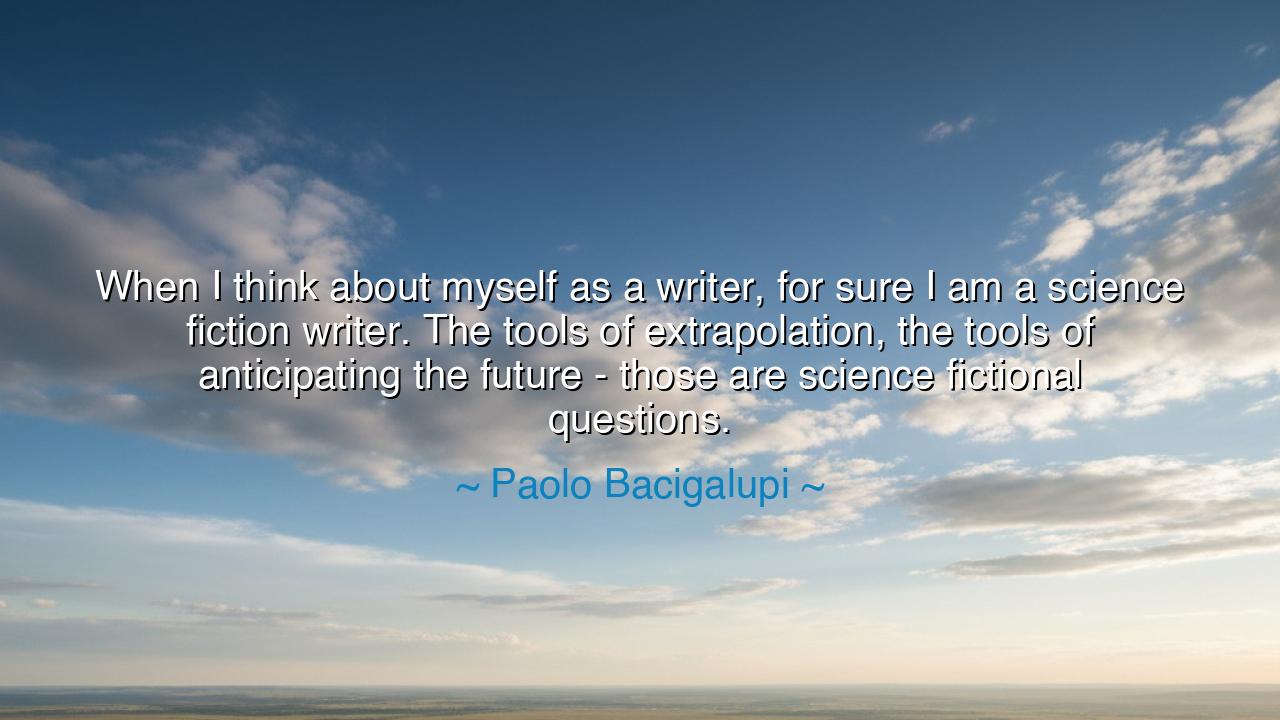
When I think about myself as a writer, for sure I am a science
When I think about myself as a writer, for sure I am a science fiction writer. The tools of extrapolation, the tools of anticipating the future - those are science fictional questions.






Hear, O seekers of wisdom, for I bring forth the words of Paolo Bacigalupi, a master of tales spun from the loom of imagination and foresight. He speaks thus: "When I think about myself as a writer, for sure I am a science fiction writer. The tools of extrapolation, the tools of anticipating the future—those are science fictional questions." These words are not mere musings of a writer, but a declaration—a proclamation that the work of the storyteller is not simply the recreation of the present, but the shaping of possibilities yet to be. It is the work of those who dare to see beyond the veil, who wield the mighty tool of imagination to carve paths into the unknown.
To think in terms of the future, to look beyond the present moment and into the ever-expanding horizon, is the gift of the visionary. What is science fiction, if not the art of anticipating what could be? The extrapolation that Bacigalupi speaks of is the practice of following the threads of truth in the present and weaving them into the fabric of a world yet to come. It is not mere fantasy or whimsy, but the product of a mind that understands the world deeply enough to predict where it might go. In this, the science fiction writer does not simply spin tales—they warn and enlighten, they see the possibilities that others may miss.
Consider the ancient seers, the wise men and women who could read the stars and the movements of the world. Pythagoras saw in the stars the harmony of the cosmos, while Socrates looked into the heart of mankind and predicted the rise of philosophy as a tool for understanding society. These were not merely men of their time—they were men who transcended time, seeing not only what was, but what could be. They were extrapolators of their era, using the tools of their intellect to predict and shape the future. In this way, the work of the writer, especially in the realm of science fiction, is akin to the work of the ancient prophet, who gazes into the distance and speaks of what may come.
In the modern world, the tools of science fiction writers have become more refined. The advances of technology, the complexities of human society, and the interconnectedness of the world make their craft more urgent, more necessary. Consider the work of Jules Verne, who, in his novels, foresaw the rise of submarines, space travel, and deep-sea exploration. His imagination, grounded in the knowledge of his time, took what was possible and stretched it to its logical, and often startling, conclusions. It was not that he predicted the future with certainty, but rather that he used the tools of his intellect and understanding to foresee what might be—just as Bacigalupi does today.
And yet, the greatest lesson we can learn from Bacigalupi’s words is not simply about the art of writing, but about the art of seeing—about the necessity for each of us, in our own lives, to practice the art of anticipation. To extrapolate the trends of today into the realities of tomorrow is not a gift reserved only for writers, but a skill that all must cultivate. Understanding the present, the small movements, the quiet forces that shape our world, allows us to anticipate the future and make choices that are not simply reactive, but proactive. Just as the science fiction writer peers into the unknown, so too must we, as individuals, look into the horizon and ask: What will the future hold, and how can I shape it?
In the quiet chambers of the mind, where dreams and questions are born, let us be visionaries. Let us not simply walk the path laid before us, but carve new paths into the wilderness of the future. Use the tools of extrapolation, as Bacigalupi advises, and consider what might come from the actions and choices of today. In science fiction, there is always the question of consequence—what will happen if we continue down this road, or that? As we navigate our own lives, we must ask these questions, not in fear, but in understanding. The world is shaped by the choices we make now, and those who do not look forward are bound to be swept away by the tides of time.
Thus, the path forward is clear, O wise souls: cultivate the art of anticipation, and be as the science fiction writer, who does not only write the stories of today, but the warnings, the insights, and the visions of tomorrow. We must recognize that the future is a tapestry woven from the threads of the present, and the more keenly we perceive those threads, the more brightly we can shape the future that awaits us. Let us, like Bacigalupi, ask ourselves not simply what is, but what could be, and let that vision guide us toward a future that is as wondrous as it is wise.






AAdministratorAdministrator
Welcome, honored guests. Please leave a comment, we will respond soon